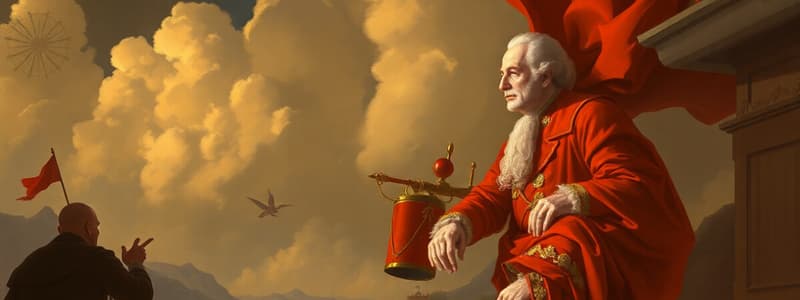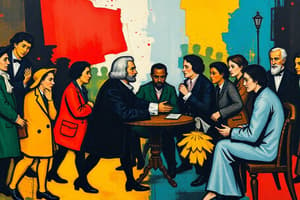Podcast
Questions and Answers
According to Rousseau, what is the primary purpose of education and customs within a political community?
According to Rousseau, what is the primary purpose of education and customs within a political community?
- To cultivate shared values and a sense of community, guiding the expression of the general will. (correct)
- To ensure absolute uniformity of thought and behavior among citizens.
- To dictate the expression of the general will, ensuring it aligns with the state's agenda.
- To prioritize the rights of the individual over the needs of the community.
Which of the following best describes Rousseau's view on the general will?
Which of the following best describes Rousseau's view on the general will?
- It is a concept that should be determined solely through institutional mechanisms.
- It is the aggregation of the private interests of all individuals in a community.
- It is a collective expression, guided but not dictated, by shared values and customs. (correct)
- It is a concept which can be directly dictated by education and customs.
What potential critique is raised against Rousseau's emphasis on the general will and particularism?
What potential critique is raised against Rousseau's emphasis on the general will and particularism?
- That it excessively supports the interests of minority groups within a community.
- That it may prioritize a specific way of life over other valid political perspectives. (correct)
- That it leads to a society where individual expression is greatly valued to that of community values.
- That it fails to distinguish between cultural sensitivity and universal human rights.
According to the content, what can be considered a potential limitation of Rousseau's political philosophy?
According to the content, what can be considered a potential limitation of Rousseau's political philosophy?
Which of the following best characterizes the role of education in Rousseau's political thought?
Which of the following best characterizes the role of education in Rousseau's political thought?
According to Rousseau's philosophy, what is the primary determinant of a good political order?
According to Rousseau's philosophy, what is the primary determinant of a good political order?
How does Rousseau's concept of the 'general will' relate to particularism?
How does Rousseau's concept of the 'general will' relate to particularism?
In Rousseau's view, what best describes the 'body politic'?
In Rousseau's view, what best describes the 'body politic'?
What is Rousseau's primary criticism of abstract universalism?
What is Rousseau's primary criticism of abstract universalism?
What is the relationship between the articulation of the 'general will' and the specific context according to Rousseau?
What is the relationship between the articulation of the 'general will' and the specific context according to Rousseau?
Which of the following best describes how a state should approach laws and institutions, according to Rousseau's emphasis on particularism?
Which of the following best describes how a state should approach laws and institutions, according to Rousseau's emphasis on particularism?
According to Rousseau, what is the consequence of imposing abstract universal principles on unique communities?
According to Rousseau, what is the consequence of imposing abstract universal principles on unique communities?
In Rousseau's view, what is the relationship between the common good and particularism?
In Rousseau's view, what is the relationship between the common good and particularism?
Flashcards
Rousseau's Particularism
Rousseau's Particularism
Rousseau's idea that a good political system recognizes the unique values and circumstances of each society.
General Will (in a particular context)
General Will (in a particular context)
The shared desires and will of the members of a specific community, not a universal standard.
Body Politic
Body Politic
Rousseau's view of society as a unified entity, made up of its citizens, which generates a collective will.
Adapting Laws to Specific Contexts
Adapting Laws to Specific Contexts
Signup and view all the flashcards
Critique of Abstract Universalism
Critique of Abstract Universalism
Signup and view all the flashcards
General Will and Specific Experiences
General Will and Specific Experiences
Signup and view all the flashcards
Preserving Community Identity
Preserving Community Identity
Signup and view all the flashcards
General Will and Community Unity
General Will and Community Unity
Signup and view all the flashcards
Role of education and customs in Rousseau's political philosophy
Role of education and customs in Rousseau's political philosophy
Signup and view all the flashcards
Purpose of education and customs in Rousseau's model
Purpose of education and customs in Rousseau's model
Signup and view all the flashcards
Limitations of Rousseau's focus on general will
Limitations of Rousseau's focus on general will
Signup and view all the flashcards
Balancing cultural sensitivity and universal human rights in Rousseau's philosophy
Balancing cultural sensitivity and universal human rights in Rousseau's philosophy
Signup and view all the flashcards
Rousseau's perspective on political philosophy
Rousseau's perspective on political philosophy
Signup and view all the flashcards
Study Notes
Rousseau's Concept of Particularism
- Rousseau's philosophy, while linked to general social contract principles, highlights a nuanced understanding of particularism. This is rooted in his emphasis on the general will and the common good, inseparable from a community's specific characteristics.
- A successful political system stems not just from abstract principles, but from appreciating a society's unique circumstances and values. Rousseau advocated for a perceptive understanding of a community's distinctive traits, customs, and traditions.
Emphasis on the "General Will" in a Particular Context
- Rousseau's general will isn't a pre-ordained standard, but the collective desires of citizens within a specific community. This particularity is essential; the general will’s formation hinges on the community's unique realities.
- The general will isn't a reflection of existing inequalities, but an outcome of public dialogue fostering unity and purpose.
The Importance of the "Body Politic"
- Rousseau viewed society as a "body politic," a collective entity composed of individual citizens. This collective body generates a will. This will is fundamentally linked to particular features of a specific people and their traits.
- This close relationship means political structures and laws are not universal. They should be tailored to address the particular needs and dynamics of each society.
Critique of Abstract Universalism
- Rousseau countered abstract universalism, viewing it as potentially harmful and overly simplistic. Implementing universal principles in diverse contexts risks hindering harmony and suppressing unique identities.
- Applying general principles without considering specific community needs ultimately fails to serve the common good.
The Role of Education and Customs
- Rousseau stressed the importance of suitable education and the cultivation of virtuous customs for a thriving political community. This fosters shared values and societal cohesion.
- These elements are community-specific; they cultivate a distinct identity rather than homogenization. They shape the general will, guided by custom rather than dictating it.
Limits to Rousseau's particularism
- Rousseau's focus on context-specific politics isn't without limitations. His concept of achieving the general will might lead to prioritizing certain lifestyles over others, potentially neglecting equally valid but less favored perspectives.
- His ideas raise contemporary questions about balancing cultural sensitivity with universal human rights.
Studying That Suits You
Use AI to generate personalized quizzes and flashcards to suit your learning preferences.
Description
Explore Rousseau's nuanced understanding of particularism in relation to the general will and the common good. This quiz delves into how his thoughts emphasize the importance of community-specific values and circumstances in political order.




